Structure of the Thyroid Gland
The thyroid gland consists of two lobes connected by a thin strip of tissue called the isthmus. It is made up of numerous follicles that contain cells called follicular cells, which produce and store the thyroid hormones. The gland also contains parafollicular cells that produce the hormone calcitonin, which helps regulate calcium levels in the body.Functions of the Thyroid Gland
The thyroid hormones T3 and T4 play a significant role in regulating the body's metabolism. They influence the rate at which the body uses energy, regulate body temperature, and affect heart rate and protein synthesis. These hormones are also crucial for the normal growth and development of tissues and organs, particularly in children.Regulation of Thyroid Hormone Production
The production and release of thyroid hormones are regulated by the pituitary gland, which secretes thyroid-stimulating hormone (TSH). TSH stimulates the thyroid gland to produce and release T3 and T4. The levels of T3 and T4 in the blood, as well as the levels of TSH, are tightly regulated through a feedback mechanism involving the hypothalamus, pituitary gland, and thyroid gland.Thyroid Disorders
Several conditions can affect the thyroid gland, leading to either overproduction (hyperthyroidism) or underproduction (hypothyroidism) of thyroid hormones. Additionally, the presence of nodules or enlargement of the thyroid gland (goiter) can also indicate thyroid dysfunction. Common thyroid disorders include Graves' disease, Hashimoto's thyroiditis, and thyroid nodules.Study Guide
To study the thyroid gland effectively, consider focusing on the following key points:- Understand the structure of the thyroid gland, including its lobes, follicles, and cell types.
- Learn about the functions of the thyroid hormones T3 and T4 in regulating metabolism, growth, and development.
- Explore the regulation of thyroid hormone production through the feedback mechanism involving the hypothalamus, pituitary gland, and thyroid gland.
- Gain knowledge about common thyroid disorders, their causes, symptoms, and treatments.
- Review the factors that can impact thyroid health, such as iodine deficiency and autoimmune conditions.
[Thyroid Gland] Related Worksheets and Study Guides:
.◂Science Worksheets and Study Guides First Grade. Weather
Study Guide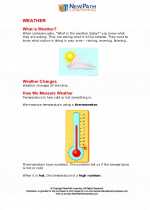 Weather
Weather  Activity Lesson
Activity Lesson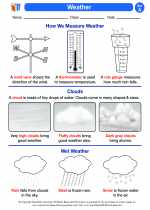 Weather
Weather  Worksheet/Answer key
Worksheet/Answer key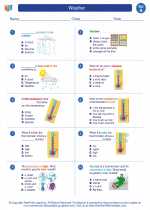 Weather
Weather  Worksheet/Answer key
Worksheet/Answer key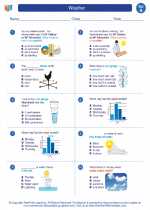 Weather
Weather  Worksheet/Answer key
Worksheet/Answer key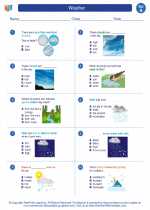 Weather
Weather  Worksheet/Answer key
Worksheet/Answer key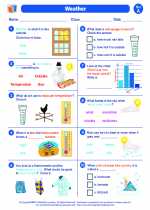 Weather
Weather  Vocabulary/Answer key
Vocabulary/Answer key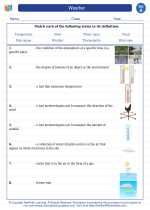 Weather
Weather  Vocabulary/Answer key
Vocabulary/Answer key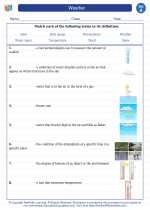 Weather
Weather 

 Activity Lesson
Activity Lesson
 Worksheet/Answer key
Worksheet/Answer key
 Worksheet/Answer key
Worksheet/Answer key
 Worksheet/Answer key
Worksheet/Answer key
 Worksheet/Answer key
Worksheet/Answer key
 Vocabulary/Answer key
Vocabulary/Answer key
 Vocabulary/Answer key
Vocabulary/Answer key

The resources above cover the following skills:
Earth Systems Science
Earth's materials can be compared and classified based on their properties. Students can:
Identify and represent similarities and differences such as the texture, size, color, and shape of various materials on Earth